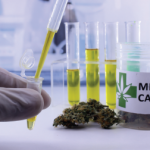Dr. Fitzcharles believes rheumatologists are right to caution patients about the risks associated with using cannabis, particularly when the THC content is high. Use of marijuana with a high THC content, even for medical reasons, is associated with acute cognitive changes and impaired coordination and motor control—factors that are especially important for patients who may be struggling with stability due to joint pain. Another point of concern is the effect of cannabis on brain development, which continues into the mid-20s, and may have consequences for adolescents who use marijuana for the management of juvenile arthritis. The effect of smoked marijuana on lung health is also of concern for rheumatology patients.
To date, no information exists on drug interactions between the standard treatments used by rheumatology patients and cannabis, but Dr. Fitzcharles stresses caution for patients who replace standard rheumatology medications with cannabis. She shares the case of a patient with rheumatoid arthritis who chose to substitute her disease-modifying treatment with cannabis in the belief that this would be an effective treatment to control inflammation and disease activity. A 2016 survey study co-authored by Dr. Fitzcharles indicates that patients who are or were recreational marijuana users, such as this patient, may be more likely to self-medicate with marijuana.6
Dr. Fitzcharles does believe “the potential for identifying the correct molecule within the cannabinoid system to alleviate pain is terribly exciting.”
Revealing the Endocannabinoid System
Dr. Fitzcharles explains that the endocannabinoid system is found throughout the human body as receptors and ligands that work by restoring homeostasis, affecting pain and inflammation. Although mostly identified in neuronal tissues, the endocannabinoid system extends to skin, bone and joints. Specific molecules within this system, such as anandamide and 2-arachidonyl-sn-glycerol (2-AG), have been found to bind to cannabinoid receptors and activate this system.7 Exogenous cannabinoids, such as those extracted from plants (e.g., phytocannabinoids) or synthesized pharmaceutical preparations, may also function to activate this system and, thereby, have potential for therapeutic effects.
“Basic research has produced a lot of good work to [help] understand how the endocannabinoid system puts the body back into equilibrium through mechanisms, such as reducing pain and inflammation and promoting appetite and sleep,” she explains. “The challenge is to identify the specific molecule or combination of molecules, as well as the ideal molecular concentrations in the cannabis plant or a pharmaceutical preparation, that can be most effective to target pain and inflammation. At this point, the clinical evidence to identify these molecules is not there, but the promise of identifying these mechanisms in a way that could help patients is very intriguing.”



